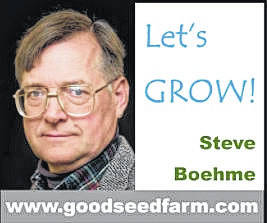
Vegetable plants can be either “heirloom” or “hybrid”, “GMO” or “Non-GMO”. Many people feel strongly about this. But what exactly is an heirloom vegetable, and why is it more desirable than a “hybrid” plant? What about GMO’s? Are they dangerous?
Plant hybridizing is the process of inventing new plants by combining the best qualities of other plants. Hybridization has been going on for centuries, and it’s a major reason the earth can support increasing numbers of people. New varieties can also occur naturally by cross-pollination. “Sports” (non-matching branches or fruits) sometimes appear on plants by genetic mutation, creating entirely new varieties “naturally”.
Breeders cross-pollinate under controlled conditions, or reproduce young plants from sports, to get predictable offspring. The process is a lot like raising pedigreed animals. Hybridizers patent their varieties for a certain period of years from when the plant is introduced, charging “royalties” to pay for their work. They constantly introduce and promote new varieties in order to increase their royalty income.
Seeds from some hybrid plants produce plants that are different from the parent. Our definition of an heirloom plant is one that is no longer patented, with seed that will produce the identical plant if you save it from year to year. Some heirloom plants are patented hybrids whose patent has expired, which reliably produce seedlings identical to the parent. The important thing is that you can save the seed and get the same plant from it.
Does your survival really depend on saving your vegetable seeds to plant next year? Some people believe that’s a realistic possibility, so saving heirloom seeds is a key to preparing for a world food crisis. For others, simply preserving the diversity of interesting and unusual plant varieties is an important priority.
There are good and not-so-good heirlooms. Heirloom varieties can taste better or different, but heirloom plants generally yield about half as much fruit with the same amount of fertilizer, water, and space. One reason to grow them is that the more diverse our selection of food plants, the less risk from new pathogens wiping out an entire crop.
The argument for patented hybrids is that breeders may have improved the disease resistance, yield, taste, attractiveness of the fruit, growth habit, drought tolerance and other traits. There are hybrids that are terrific for home gardens, and some that are better for commercial growers and shippers; you just have to learn which are which.
GMOs, or “genetically modified organisms,” are plants or animals that have been genetically engineered with DNA from bacteria, viruses or other plants. These combinations of genes cannot occur in nature or with traditional breeding methods. Most GMO food crops are engineered so that weed killers won’t kill them, or have ingredients that will poison specific insects. This makes these crops much cheaper to grow commercially. The main consumer benefit of GMO’s is to reduce food prices by making farming more efficient.
Experts disagree about GMO safety. Many countries have restrictions or outright bans on the production and sale of GMOs. Increasingly, Americans are taking a cautious approach and seeking out non-GMO seeds, plants and foods. Most plants and seeds for home gardens are not GMO’s. In any case, home gardening with your choice of GMO or non-GMO seeds gives you control over the safety of your family’s food supply.
Steve Boehme is a landscape designer/installer specializing in landscape “makeovers”. “Let’s Grow” is published weekly; column archives are on the “Garden Advice” page at www.goodseedfarm.com. For more information is available at www.goodseedfarm.com or call GoodSeed Farm Landscapes at (937) 587-7021.


